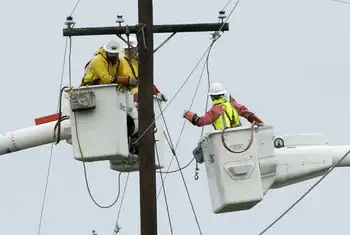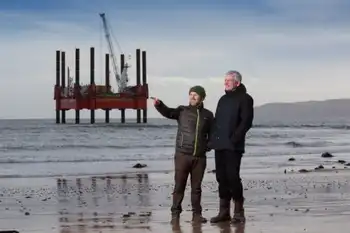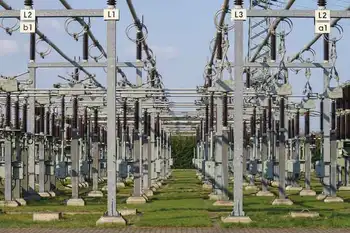More challenges leveled at power line
By Knight Ridder Tribune
NFPA 70e Training - Arc Flash
Our customized live online or in‑person group training can be delivered to your staff at your location.

- Live Online
- 6 hours Instructor-led
- Group Training Available
In filing a report on behalf of Dynegy, Inc., the company that wants to replace the aging South Bay power plant in Chula Vista with a modern one nearby, an official said generating plants can be built faster than transmission lines, and without the energy loss that occurs when electricity is transported long distances over wires.
"The most effective way to serve electric demand is to locate the supply close to the load," said Ali Amirali, managing director for regulatory policy and transmission for Dynegy in Sacramento. San Diego Gas & Electric disputed the notion that local plants would be more economical than long-distance wires.
Amirali's comments came in a report filed in connection with San Diego Gas & Electric's proposed $1.3 billion Sunrise Powerlink transmission line, which would run 150 miles from El Centro to Carmel Valley. Featuring thick wires strung from steel towers p to 150 feet tall, the project would wind through Anza-Borrego Desert State Park, Santa Ysabel, Ramona and Rancho Penasquitos.
The reports, called testimony, help set the stage for California Public Utilities Commission hearings on the need for the line starting July 9 in San Diego. The commission is scheduled to decide whether to issue a permit for the line in January.
Scott Crider, public affairs manager for the Sunrise Powerlink, said, "It's no surprise that energy companies that want to build fossil fuel power plants in San Diego County are going to oppose a transmission line that is going to deliver renewable power from Imperial Valley."
Besides shoring up the region's electricity supplies, the Sunrise power line is being sold on the premise that it would plug San Diego County into the solar and geothermal power in Imperial Valley, helping the region comply with a state mandate to secur 20 percent of its supplies from non-fossil-fuel sources.
"What they're looking to do is to commit our customers to a local-generation-only strategy," Crider said.
"And that will commit our customers to a fossil-fuel future and limit our ability to increase the use of green energy." As for the specific charge that the line would be more costly, Crider said "the experts simply don't agree." He cited a study by the California Independent System Operator last summer that concluded the line would be the most efficient way to meet future electricity needs.
The line is sharply opposed by environmentalists and communities along the preferred route. In other testimony, Elizabeth Goldstein, president of the California State Parks Foundation, stated that building the power line through the 600,000-acre Anza-Borrego Desert State Park would establish a "dangerous" trend that could undermine one of the nation's most extensive state park systems.
She urged the state to reject the project, or order a route around the park. "The new transmission lines will be visible from great distances," she said. Goldstein said the proposed 140 towers in the park would require construction of 140 new spur roads that, besides providing utility workers access to the line for repairs, would subject pristine areas and archaeological sites to vandalism.
Crider said the foundation's objections "are really outside the scope of where we are at right now" and will be addressed in an environmental study released later this summer. In testimony on behalf of the Ramona community group Mussey Grade Alliance, consultant Joseph Mitchell stated that based on historical fire trends in California the Sunrise Powerlink could be expected to ignite a wildfire every 20 years.
Crider said the utility will analyze that estimate. Generally speaking, he said, "high-voltage transmission lines like Sunrise represent a very low fire risk to the region." Crider said the steel towers don't catch on fire and are built to withstand strong wind. On June 15, the utility is scheduled to submit testimony rebutting reports filed recently.











